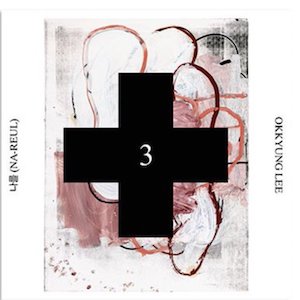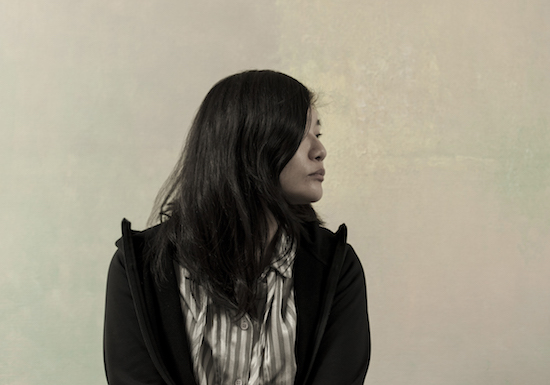Okkyung Lee by Lasse Marhaug
Rum Music’s introductory ramble this month is one of remembrance and farewell. While hope returns in the easing of lockdown and the return to pubs, hangovers, music and friends, this month was also punctuated by devastating losses.
Musician and recording engineer John Hannon of Liberez and No Studios, among many other projects, died suddenly a few weeks ago. Regular readers to this column and indeed tQ more generally will have heard something he worked on or played on. Hundreds of bands passed through his studio in Essex. Having watched him working in the studio during the recording of Heather Leigh’s Throne, I recall being blown away by his ears; the way he listened and worked on the music, with a light touch for intangible but enormous effect – he worked like Brasso on the bass, and drew out the record’s woozy feel. Hannon was an incredibly smart, kind and gentle human who will be enormously missed, particularly to the scene around Southend-On-Sea.
Yoshi Wada also died unexpectedly this month, a drone maestro, bagpipe player and Fluxus original, whose recordings have only established themselves in the canon in the last decade or so, thanks to the efforts of his son Tashi’s Saltern label (a release from which I open with this month). We also lost Italian odd-pop maestro Franco Battiato, whose music has been the route out of many a listening rut for me, and also tragically, Brian Hamill of Glasgow publishing imprint The Common Breath, who was making such great strides in fermenting a new underground literary scene in Scotland.
We who remain continue onwards. Life is precious. Live well, friends.
Yoshi Wada – The Appointed Cloud
(Saltern)
Reported to be Wada’s favourite of his recordings, and also his first large scale interactive installation, The Appointed Cloud was a 1987 performance in the Great Hall of the New York Hall of Science. What you hear playing is his custom pipe organ among other homemade instruments, plus four musicians on bagpipes and a percussionist. It starts slow and searching, then the bagpipes drop in dagger-sharp and unending. Fantastic. There are gongs, big timpani-sounding drums, metal sheets rattled like foley thunder, and bells. The nature of the organ gives it a naive Reichian character and there is a theatricality about the production whereby it could at times be the soundtrack from a dialogue-less play about the weather. It is a show I would have loved to have experienced in situ, not just because there were spacecraft hanging from the ceiling in the performance space, but also to see this collection of instruments gathered together.
Leather Rats – No Live ‘Til Leather ’98
(Bokeh Versions)
I bought this pretty much blind after reading Miles at Bokeh Version’s write up. (He seems to be carving out a small but irresistible niche in batshit fusions of punk/ psychobilly and dub/ dancehall.) Leather Rats is like Hasil Adkins on tour with Suicide when Craig Leon was on the desk; it’s Lux Interior and Keith Hudson for On U Sound. This is dub music for sewer dwelling punks. Think Escape From New York dystopia dancehall emanating from a subterranean basement club – damp and rotten, infested with low echo and sound seepage – only with a Wembley-sized audience green screened in. Apparently Leather Rats were a psychobilly punk act but Bokeh is going for psychodubilly and I can dig the concept, big time, if not quite get behind the neologism. The story is they never made it into a studio – these live recordings are allegedly from Japan in the late 90s where they also allegedly had a huge following… but make of that what you will. I can enjoy any fictional back story if it comes with zombie licks like this. If you or anyone you know of any neglected ‘psychodubilly’ acts, new or old, please do get in touch.
Okkyung Lee – 나를 (NA-REUL) (Black Cross Solo Sessions 3)
(Corbett vs. Dempsey)

Incredibly beautiful solo album from cellist Okkyung Lee, sombre, and attentive to drama and balance. Lee’s playing is often visceral and abrasive (although last year she did turn her hand to some more syrupy K-pop influenced ambient songs) but this feels like a return to core principles. Having spent most of the year in Korea without her instrument, when she returned to New York her disconnection from it remained. After many, many months away sunk in the grief of the pandemic year, something clicked: "To my surprise, crystal clear musical ideas merged rapidly, and more importantly, that spark returned. I had something to say through music again." I repeat this quote because it really does feel like Lee’s playing has a great deal of clarity on this album; there is much power and grace in its forms. There is a spirit, a feeling, an intent in all these pieces, a lossless psychic signal channelled directly through her instrument. It is released any day now on Chicago label and gallery Corbett vs. Dempsey, as part of a series that includes Joe McPhee and Ken Vandermark, among others. No streaming up yet, but more information can be found here.
Eimear Reidy & Natalia Beylis – Whose Woods These Are
(self-released)
The day after I got my jab I felt a bit washed out; nothing serious, but enough to make me shrink from any, well, serious listening. This album was a salve, it got me out of bed into clothes and out of the house for a walk. Beylis picks out simple piano and organ lines, an easy fluency that caresses the resonant warmth of Reidy’s cello running breathy and low. These three tracks are about trees, prompted by Robert Frost’s ‘Whose Woods These Are’, which moved into the public domain this year. Beylis and Reidy imagine a utopia where the trees go public domain (imagining the disintegration of land ownership by proxy). There is much space to breathe here and those who crave more might be similarly settled by hearing the seasons unfurl in the monthly sessions Laura Cannell and cellist Kate Ellis are recording and releasing throughout this year.
Foodman – Yasuragi Land
(Hyperdub)
We are at a time where much music is made by world weary individuals dealing boldly with difficult themes. So, it is with some lightness and joy that I received an album about food and bathing by the plainly named Foodman, who likes Japanese motorway service station food and public baths. It dropped in my inbox a month ago and I’ve been loving its cheerful boinging energies that come over in details like the eager hi hats in ‘Ari Ari’ and a computer game music jerkiness (or jauntiness?) that runs throughout. This bounce alongside a few silky house-adjacent moments (see ‘Sanbashi feat Coto Center’) reminds me at times of Soichi Terada. This is really out of deep field for Hyperdub as it contains almost no bass. Top track/ theme tune is ‘Michi No Eki feat. Taigen Kawabe’. It’s not out till July, but tracks are streaming now.
Blod – Missväxt
(Ba Da Bing/Grapefruit Records)
Prolific Gothenberg musician Blod is Gustaf Dicksson, and his records frequently sell out before I get my hands on them. Thanks to Louis for the personalised alert this time, as this one’s a cracker, a medieval DIY album that is apparently "exploring the myth of ancient Swedish being and misery". Just how miserable its lyrics are, is lost in translation for me (although Missväxt means bad harvest). As well as Dicksson there is Elin Engström on drums, Astrid Øster Mortensen on vocals and flute, Joakim Karlsson synths, and Magnus Jäverling on flute, and these songs operate as if from a Wicker Man/ Midsommar forest clearing, and are compelling and loose as if a documentation of a pre-Industrial folk collective, experienced through a gauze of magic and folklore. It also comes bundled with a tape of experimental church organ music, if you somehow haven’t heard enough of that yet.
Chora(s)san Time-Court Mirage – Blues Alif Lam Mim
(Blank Forms)
More CC Hennix from the archives via Blank Forms. I have often recommended Hennix’s ‘Blues Dhikr Al-Salam (Blues Al Maqam)’ on the Chora(s)san Time-Court Mirage Live At The Grimm Museum Volume One to people craving the drone, and this piece is performed by an extended version of the same just intonation ensemble. Documented on here is the premiere of ‘Blues Alif Lam Mim in the Mode of Rag Infinity/ Rag Cosmosis’ from April 22, 2014, (previously out on CD via Important). It is intended "to reveal the blues’ origins in the eastern musical traditions of raga and makam" and Hennix explains it as "fragments of ‘raga-like’ frequency constellations following distinct cycles and permuting their order, creating a simultaneity of ‘multi-universes’". The Chora(s)san Time-Court Mirage recordings are towering and unparalleled transcendental microtonal ecstasies, you will not find anything better.
Zhu Wenbo – HALF
(self-released)
Listening to this new 90-minute recording from Zhu Wenbo, label head at the fantastic Zoomin’ Night, directly after CC Hennix could initially make it come off like an amateur version of Blues Alif Lam Mim, which would do it a disservice. For one, Wenbo delights in the joy of the amateur, and for another, what’s happening on here is totally different to Hennix’s tight pitch control. This is instead a documentation of Wenbo’s curiosity about sound. He plays a sequence of single notes on resonant instruments – clarinet, bass clarinet, viola, flute – as well as theremin, with accompaniment by a fan (the sound of fans features frequently on Wenbo’s own music and the music he releases – I like to think of it as a sort of non-musical marker). Where it is similar to Hennix is that it is about deep, focused listening, because HALF delivers when you listen to the shape and textures – all the detail and interest – in an instrument’s sound, even when it’s just playing one single note.
Ursurabi – Remains of the Light
(An’Archives)
French label An’Archives consistently produce the most beautiful records on the shelf, and largely release Japanese underground musicians, so this lo-fi alt-pop album is a bit unusual for them. Led by songwriter, singer and guitarist, Toshimitsu Akiko (Doodles and Aminome) with underground stalwart and Haino collaborator Kawaguchi Masami (New Rock Syndicate, Hardy Rocks, Miminokoto) and drummer Morohashi Shigeki (Majutsu no Niwa, Uchu Engine, peaflan, Alraune), it’s cute and easy, with a late-night 4-track version of that naive Raincoats/Pastels feel. Charming.
AOB
The good thing about a rabid reissues market in which linear time and trends are scrambled like encrypted radio transmissions is that sometimes stuff you’ve had in your Discogs want list for over five years pops up in a more affordable and/or plusher form than the spenny £200 box set of cassettes you missed out on back in 2014. I’m talking about the new age vibes of The Healing Music Of Rana, which is being reissued for the second time on Aguirre.


